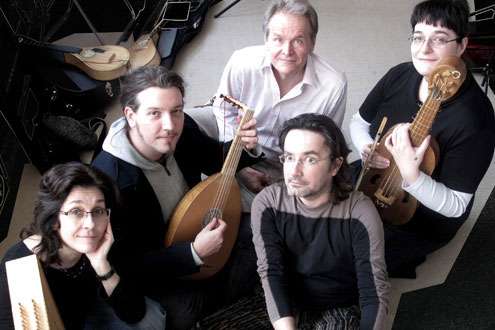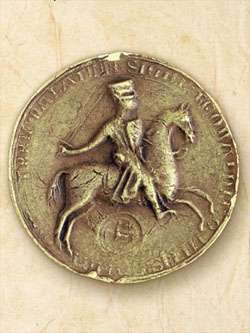|
Back
Court Gestures New York
Medieval Sculpture Hall, Metropolitan Museum of Art
12/13/2012 -
Thibaut de Champagne & Le Manuscrit du Roi (Thibaud Duke of Champagne and the King’s Manuscript)
Alla Francesca: Brigitte Lesne (voice, harp, percussion, direction), Pierre Bourhis, Emmanuel Vitorky (voices), Vivabiancaluna Biffi (violin), Michael Grébil (lute, cittern, percussion)

Alla Francesca (© Metmuseum.org)
Thibaut IV, King of Navarre and Duke of Champagne had a problem. Not the problem of how to incessantly travel, woo, fight, administer and do his religious duties while managing to write so much music. But a recruitment problem.
Double-tasking as both King of Navarre and Count of Champagne, (he was a man of many crowns), Thibaut IV had led a Crusade down to the Holy Land, where his Royal Ass was suitably whupped by Saladin and those nasty old Arabs and Kurds. So when he was told by God to return again, nobody wanted to go with him. It just didn’t sound like a good proposition. How, then, could King Thibaut get some troops to follow him?
Well, he did what any modern advertising man would do a thousand years later. In he Year of Our Lord 1253 (or thereabouts), the King/Count wrote a rousing recruiting song, figuring that if his vassals would start humming the melody of his Seignor, saiches qui or ne s’en ira and its glorious words, they would soon be marching down to Palestine and onward to glory.
The words sound much like Taliban recruiting songs today–”Those who won’t bear the cross will never come to paradise... All the valiant knights who love God will go to Your place where we behold You in all holiness” etc etc.
Thibaut, a combination Irving Berlin and Donald Rumsfeld, must have succeeded, because he did lead some zealous Christians to the Holy Land, and came back alive. He also succeeded because no less a poet than Dante called him “one of the immortal poets” and because a millennium later, the noted French group Alla Francesca made a recording of his music and performed it last night at the Metropolitan Museum of Art.
Alla Francesca consists of five splendid and very serious musicians. Their instruments, their gestures (for their hand movement illustrating the songs were graphic) and presumably their voices were replicates of the royal trouvère music of the 12th and 13th Centuries. More specifically, Thibaud was the prime representative of the courtly music-makers. There are so many examples (I heard that nearly 2,000 melodies survive) that the few examples last night in a one-hour program gave one impetus to find more.

Seal of Thibaut IV(© French National Archives)
First, we had great variety. These were love songs, and the aforementioned patriotic recruiting songs. But the group also had a “dispute” song, where a lady challenged Thibaut himself, calling him a liar and implying that he was overweight besides.
“Love’s not made you thinner,” she says to him. “On the contrary...”
Religious music was represented by a gorgeous piece on the letters of Mary’s name, a strophic song with harmonies of bells at the appropriate times. The one constant instrument was the violin, played by Vivabiancaluna Biffi. I was under the impression that the violin didn’t make an appearance until the mid-16th Century, but was wrong here. The leader of the group, Brigitte Lesne, played a variety of instruments, including the “psaltery harp” and (what looked like) a large tambourine without bells, played for the military music.
We also had a small lute, some cheerful strumming on a cittern (like a mandolin or guitar) and the two voices sung by Pierre Bourhis, Emmanuel Vitorky, joined by some of the others.
The result was indeed courtly music. It was precise, gracious, elegant, sung and played by Alla Francesca with quiet expertise. Although the poems were ex cathedra. one didn’t feel, as with the street music of the time, that this was music for dancing or joining in. Rather, one pictures a wooden uncomfortable fire-lit room, mugs of wine, a slaughtered deer or pig, and, at the end of the dinner, some professional entertainers singing and strumming with the correct decorum.
Of course the host of the evening, Thibaut IV soi-même was the leader of the group, for he had composed this music when not performing his Royal duties. Thanks to Alla Francesca, who are superstars themselves at medieval music festival, the stately Met Museum’s Medieval Sculpture Hall we were offered a taste of these stately courtly songs.
Harry Rolnick
|